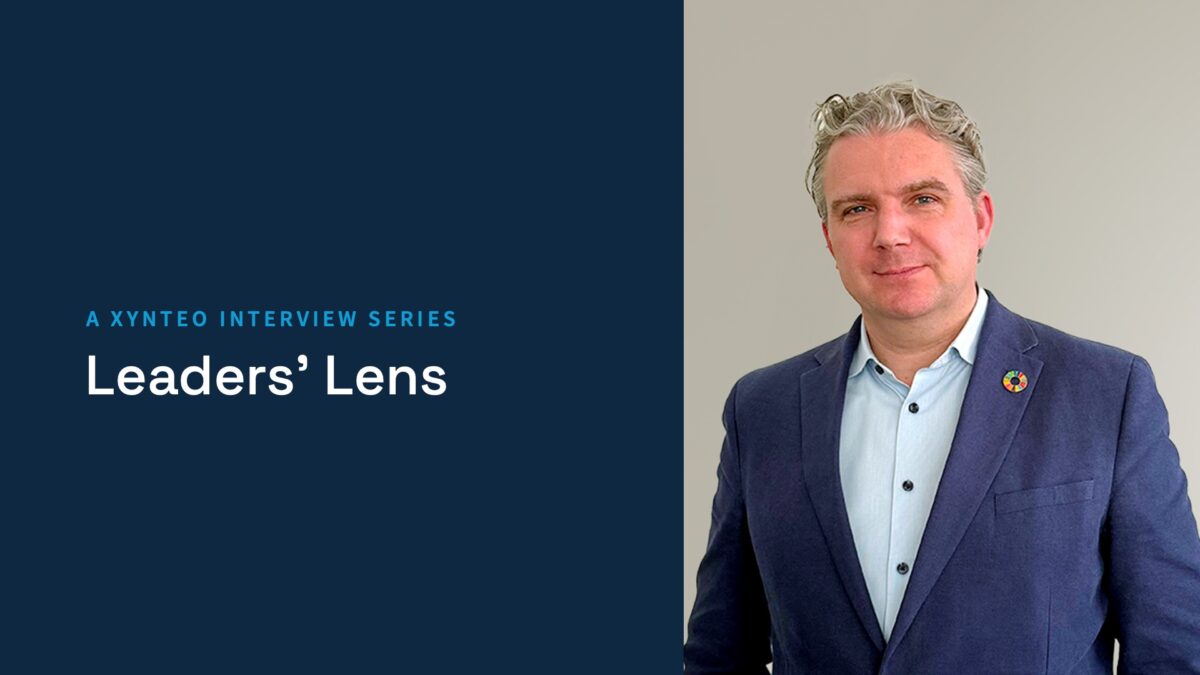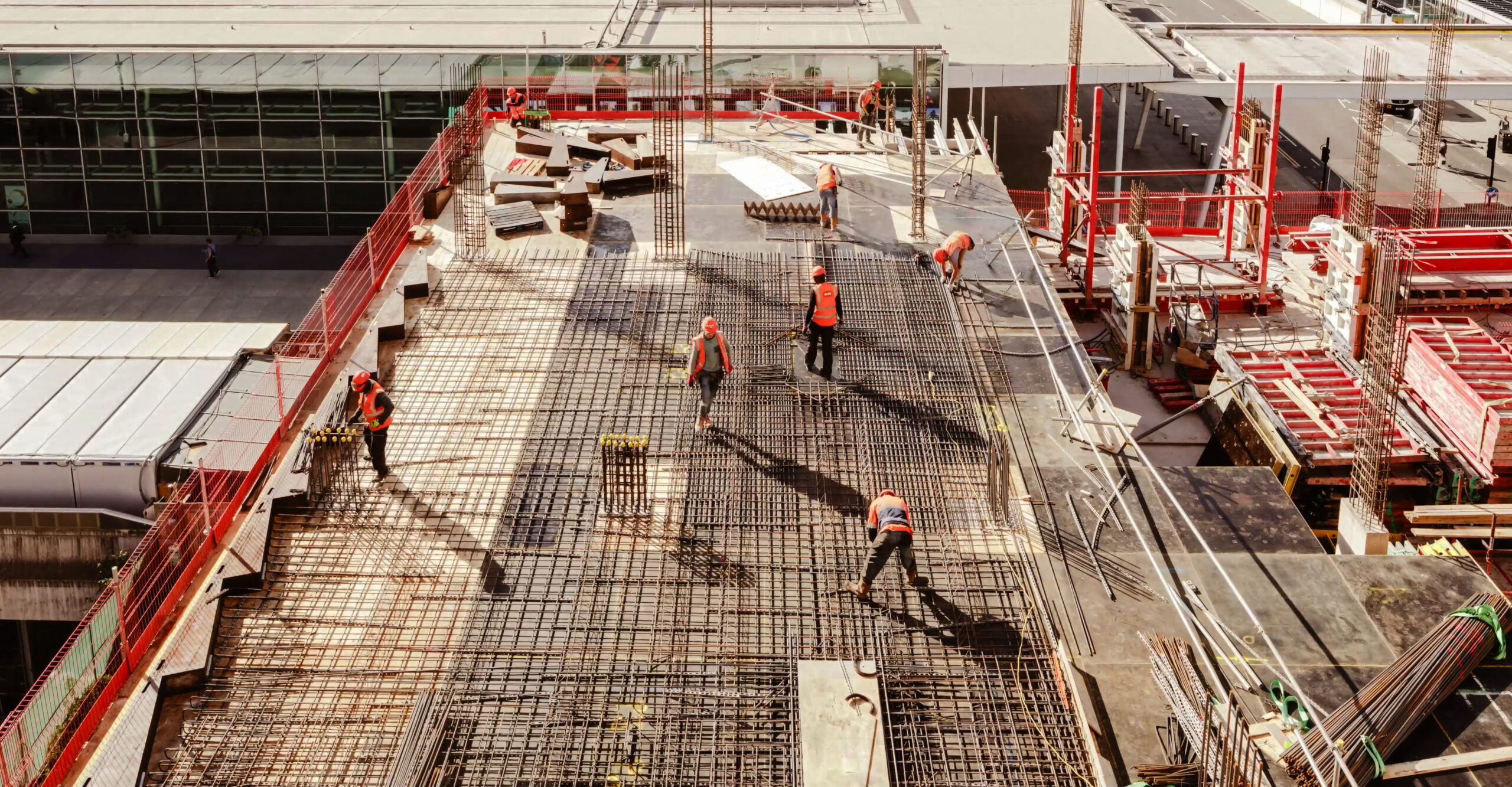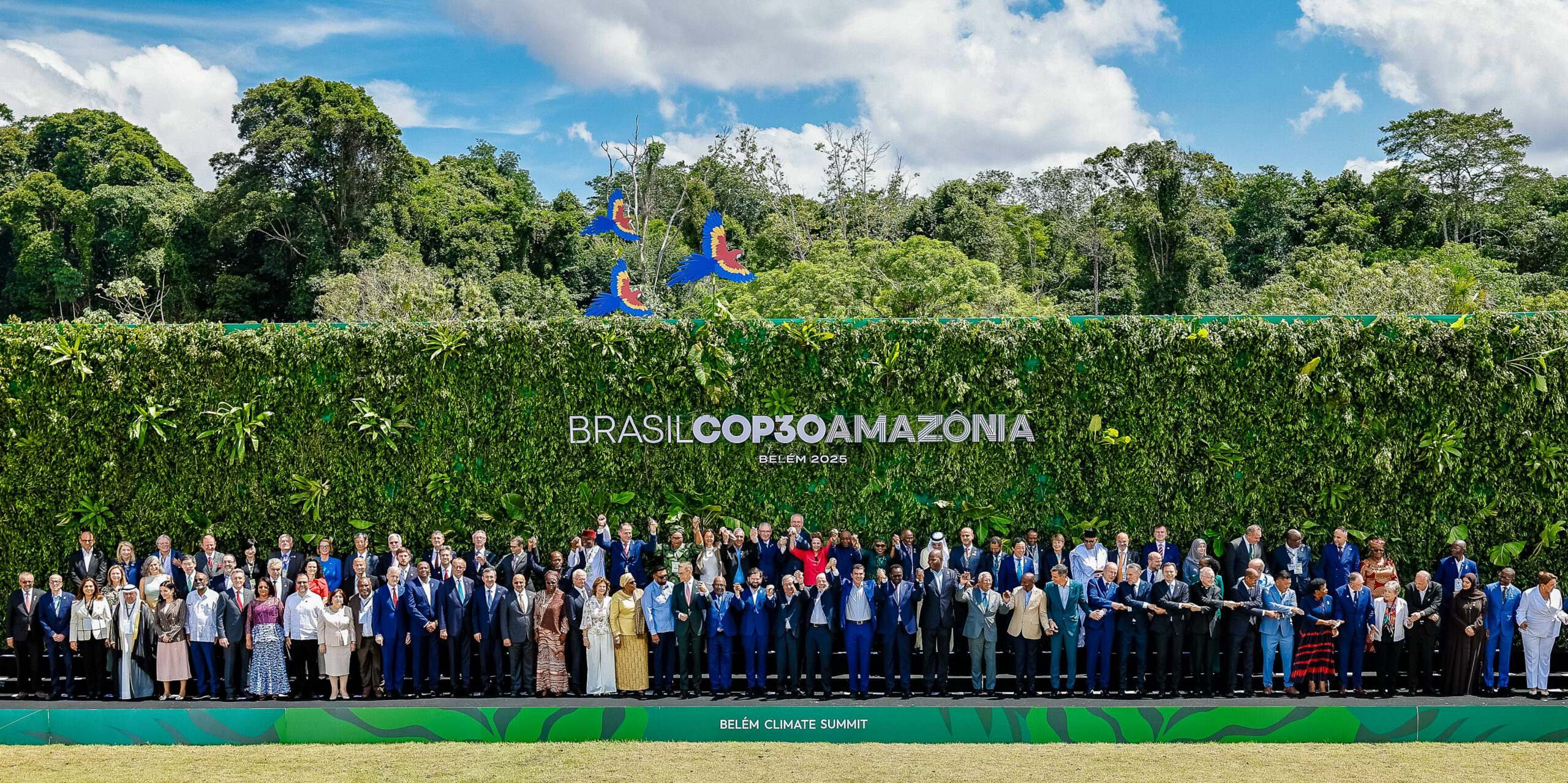Meet Sam Preece, Xynteo’s newest Partner, a sustainability veteran with an impressive 25-year career that’s seen him navigate the complex worlds of investment funds, global consultancies like PwC and ERM, and leadership roles at major firms such as AECOM.
In this engaging chat, Sam delves into the pivotal experiences that have shaped his perspective, revealing the core ingredients for organisations to thrive in today’s intricate sustainability landscape. From the critical role of collaboration and the power of capital to the indispensable need for deep technical expertise, he unpacks the big opportunities and pressing challenges. We also explore what continues to fuel his passion for making a real difference in the field, and discover the compelling reasons why, after such an established career, the dynamic and agile environment of Xynteo proved to be the perfect next step for him.
You’ve built an impressive 25-year career spanning investment funds, global consultancies like PwC, ERM and now Xynteo. How has this diverse experience—from leading AECOM’s UK environment business to being PwC’s UK representative on their Global Sustainability Reporting leadership team—shaped your perspective on what organisations really need to succeed in sustainability?
Sam: Historically, sustainability activities have been driven by the performance requirements of a business—trying to improve the outcomes of the business itself—the aspirations and appetites of individuals, customers, clients, and organisations, and obviously, the overriding need for action on certain key themes and topics. Lately, though, several other components have driven sustainability activity in recent times, with a strong regulatory and compliance driver being one of them.
What I discovered while at AECOM—I used to work a lot in alliances and collaborative working, where we brought together multiple organisations to deliver projects—was that collaboration was essential with environmental, sustainability, and social topics. These were complex problems that didn’t sit within the boundaries of one organisation, and therefore, being able to curate and build alliances, coalitions, and networks to solve these problems was essential.
Now, Xynteo’s 20-year history of delivering coalitions is an essential component to solving problems, and indeed, probably identifying them too. That heritage, that experience, and the connectivity with senior leaders that it brings is incredibly important—one of the components for success and one of the many things that we’re incredibly good with at Xynteo.
The second thing I’ve observed as an essential ingredient is the capital to do things: the money, the human capital, the will—really, the social capital to do things. Having been involved in running funds, setting up impact funds, and advising on fundraising and deals, the speed and imperative of action that comes when the appropriate financing and reward are in play is really noticeable. I like to seek commercial outcomes as well as sustainability outcomes—optimal outcomes. So I think having that understanding of how business operates commercially, how investors operate from a commercial financial perspective, is essential.
We have that component within Xynteo as well—in fact, that’s part of our DNA, of understanding clients, organisations, and how to help them be successful and profitable as well as sustainable. Being able to bring funding partners and investors into projects and activities is a critical component for all sustainability success, in my opinion.
The final ingredient is deep technical expertise. What we’re clearly trying to achieve with Xynteo is moving very quickly from strategic imperative through to outcome and action—helping clients identify something and start getting it done really quickly. I think that comes with having deep technical expertise; it allows you to shape those projects. Lately, and probably throughout my career, I have been creating programmes and initiatives and helping drive activity—that is really important to me right now.
So, these are three crucial things, and I’m finding all of those in abundance within what we’re doing and how we’re approaching things with Xynteo, which is exciting and energising.
Having worked on every continent with some of the world’s largest organisations, what originally drew you to sustainability, and what keeps you committed to making a difference after all these years in the field?
Sam: That’s a great question. Back in school, I always liked academic subjects grounded in the planet, such as geography and geology, biology and atmospheric sciences. They fascinated me, and I wanted to work in a similar field. I’ve been lucky enough to do that throughout my career—I started as a geologist and thereafter always had some aspect of environmental or sustainability or earth science as a component of what I did. In fact, I always recommend trying to work on something that excited you as a child to anyone who’s starting their career, because that’s probably close to your heart, and that would keep you interested and curious about things.
Throughout my career, I recognised that actually finding commercially and sustainably optimal outcomes is really what drives me most. I want to make a change, and I passionately believe that engaging business and commerce to help drive change within society and the planet around it is where I can add most value.
I’ve tried to do that in different ways through my career, from technical work to investment work, while working with client organisations to set their strategies. Believing that that’s the biggest way that I can have an impact is probably what keeps me going; it keeps me interested. I keep a little mental record of the impacts that I have through my work—maybe they’re not all me, but sometimes, keeping an eye on the big picture stuff—“okay, what’s the ultimate impact of the work we’re doing?”—really helps. And I’ve just been so impressed since I’ve joined; all of our colleagues are very focused on the outcomes of what we do, helping guide our clients to have the biggest impact and make the most significant change that we possibly can. And within the first few weeks, I’ve been lucky enough to work on some really strategic projects where we’re going to be able to enhance global forestry activities and look at reducing climate impacts with massive global clients—and who couldn’t be motivated by that? I certainly am, for sure.
What we’re clearly trying to achieve with Xynteo is moving very quickly from strategic imperative through to outcome and action—helping clients identify something and getting it done really fast.
Based on your extensive work with private equity houses, global corporates, and IPO preparations, what do you see as the most pressing challenge and biggest opportunity for global organisations trying to navigate today’s complex sustainability landscape?
Sam: I’ll probably just describe a couple of key market conditions or market paradigms—I think of them as opportunities. The first is the embedding of sustainability within business processes and considerations. I consider it the maturing, the growing up, of sustainability. It’s not a side activity any more—businesses have operated like that in the past, but that’s changed. In fact, in the last six months, I’ve noticed it’s become more embedded. The work I’ve been doing with PwC over the last three years is about building core business processes to reflect material business risks from sustainability opportunities and issues that affect businesses. I think that’s a massive opportunity for us to help adjust the course of major businesses—I’d say that’s number one.
The second is related to all the activity around artificial intelligence (AI) and the application of technology. I can see AI as an incredibly helpful part of the toolkit to help take away some of the routine tasks and identify optimised paths to delivery. About 10 years ago, I started working on my first AI projects. This was before AI became mainstream—we were looking at different scenarios to see how to optimise the energy usage, the maintenance schedules and the efficiency of the sustainable operation of pumps within oil and gas facilities, so we didn’t have to repair them as often, and could use less energy to optimise production. Just being able to see how many scenarios you could run using technology allowed us to pick and determine that maybe the preconceived perception of how to operate things wasn’t actually the optimal route. There was a better path that would reduce the cost and maximise the return. So I think those two things are big opportunities.
At Xynteo too, we’re helping lots of our clients think about AI and data usage, and the sustainable footprint of that. So, there are challenges around that; as with anything that’s expanding or growing, we need to make sure we’re living within the constraints of the planet and the resources that sit there. But I think, overall, the potential opportunity definitely outweighs the implications if we manage it right.
You’ve helped organisations move beyond just gathering sustainability data to using it for strategic value creation. When you think about Xynteo’s mission to ‘accelerate sustainable impact and value creation’, what does that phrase mean to you, given your hands-on experience with sustainability reporting technology and portfolio transformation?
Sam: I think it’s about looking at ways that you can have win-wins for organisations. Many of my clients will come to the end of a conversation with me, after having talked about some commercial imperative for the business, and they say, “Okay, when are we going to talk about the sustainability part of this—I thought this is what you’re about?” Well, it absolutely is, but I don’t like to look at it on its own. I want to look at the overall benefits, and the reason for that is the term ‘accelerate’. Because I think if you can create a virtuous circle where it’s improving the performance of the business, more money is going to be directed to the activity, and if it’s improving the sustainability performance at the same time, then you can just build and build, and then you really do accelerate. It makes for a very easy decision, you know, like “Why would we not want to do this? It’s saving energy, it’s saving costs, it’s improving the performance of the business. Okay, this makes sense. Oh, and it’s reducing our carbon footprint—fantastic!” So I think that’s what it means to me—it’s about finding as many levers as we can to go faster and to help acceleration. And importantly, to use the right terms about things and not purely technical terms. People are interested, but they also want to understand what it means for their organisation.
Lots of sustainability issues are trans-organisational, cross-boundary for sure, and complex. But if you can talk about them in terms of their impact on the organisation, how changing the ecosystem of things—not just the environmental ecosystem, but the ecosystem of organisations and interactions—people will understand. They will see that they can play a role in establishing their organisation and themselves in a better position going forward, more resilient and in a stronger position. It’s so important, right? Having a purpose statement like that, it’s not just out there; we really do it every day.
After building such an established career—including leadership roles at major firms and implementing sustainability projects globally—what motivated you to join Xynteo at this particular moment?
Sam: I love building things, growing things, and making interesting and innovative things happen with teams. When I met Rasmus, Amy, and our fantastic investors, I could just see that they had the same energy, the same imperative, and the kind of entrepreneurial energy. So from a personal point of view, I just felt like, “wow, this is a place where people really appreciate that. And actually, we’re going to help each other out and make some amazing things happen together.” That’s my personal side; that’s where I find immediate energy from the people that are around me and that kind of mission.
But the broader picture that drove my decision was that my clients have the ability to do a lot of the volume work in-house with technology solutions. I talk to clients and they say, “oh yeah, we’ve already done some scenario analysis. We’ve used ChatGPT with generalised data. We’ve looked and we’ve done some research.” They come with a huge amount of completed work that we probably would have traditionally done with lots of researchers and associates, and smart experts. They can get quite a long way down the line quite quickly. So they’re no longer looking for big volume research projects. They’re looking for deep expertise and guidance, and to some degree, true advisors. People who can say, “Yeah, that sounds good, but in my experience…” or “That sounds good, but maybe just go and talk to this other client that we have and you can kind of figure it out.” So they’re looking for something different. It’s more about strategic advisory work, and it requires far greater agility within the organisation.
I think Xynteo absolutely has that—we are able to shape innovative collaborative projects with multiple parties where we can truly bring the best of the best from other organisations alongside us into a team that can serve a client in a very flexible way. So that shift in what clients need means being agile and more creative. And I think the other bit about Xynteo that was hugely attractive to me is that we can then bring technology into everything that we’re doing in our delivery.
When I talk to clients, as I mentioned briefly before, we’re very quickly trying to move through to implementation. We want to give them immediate value, insights, actions, and outcomes. Technology can help us do that; data insights can help us do that. So the ecosystem of technology partners that we have is very powerful too. Because it’s going to shift from “a client has a problem, consultant defines the problem, consultant prepares a report, report is read, client thinks about activity” to a completely different dynamic. We’re working hand-in-hand with our clients, helping define and resolve things at a much faster cadence. That’s the culture of the other partners I’ve engaged with so far; it’s like, “we want to get this stuff done. We want to make an impact through our work from the first engagement.”
So I think it’s realising that people have a far higher expectation now. They can self-serve lots of things—information, action, and activity. But they also do value the guidance around that. So when I’m helping clients choose accelerators for their work or technology platforms to do their reporting, they have a lot of information, and sometimes they just need the experience that we can bring through our senior team and our senior advisor network. And they really value the coalitions and peers that we put together to share perspectives. They also value the fact that we give them something that they can take forward themselves—we can give them a solution and let them get on with it. Hopefully, they’ll keep coming back for our expert advice and guidance, but I don’t think they want to live in a world where they’re constantly having to engage external parties to do things for them. They should be able to get to a business-as-usual scenario where they can do things themselves.
Discuss how Xynteo can provide insights to focus and rationalise your sustainability-related activities and apply expertise and technology to accelerate outcomes:
Stay up to date with our latest interviews by following us on social media (LinkedIn I Twitter), or Contact Us to find out how we can help your leaders and organisation create people and planet-positive impact.



